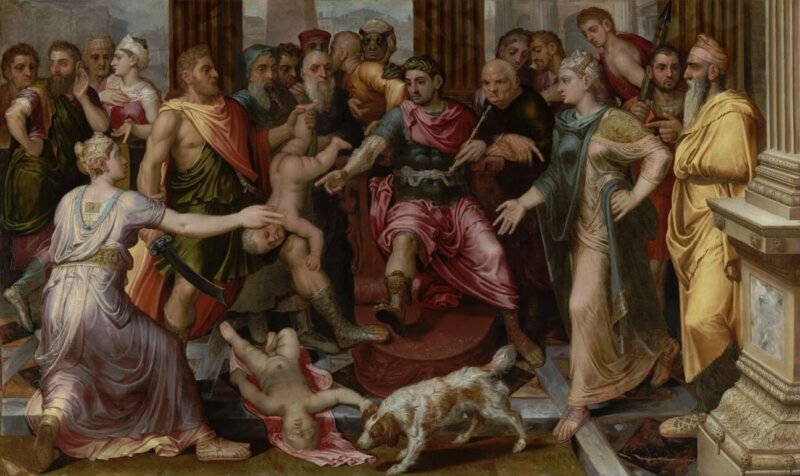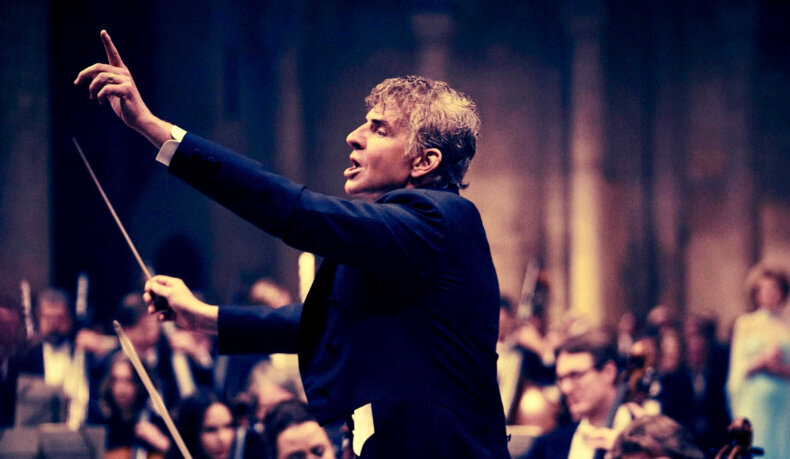Evita Laments Eternal Love—and Answers Sin with Mercy

“Thought I needed the numbers on my side / Thought the more that loved me, the more loved I’d be / But such things cannot be multiplied.”[1]
The beginning of Evita is mesmerizing for its grandeur and strangeness. A sparkling white ball gown hovers over the stage. The people of Argentina cry and mourn the death of their first lady, Eva Perón, in 1952. The tenderness of the moment is only upset by the bitterness and callousness of the narrator. Che, a disgruntled and dishonored Argentinian soldier, whose younger form we will watch glory in the goodness of the Perón administration and rise in the ranks, rolls his eyes at the affair. This woman, he argues, is not worthy of their love.
Evita, an Andrew Lloyd Weber masterpiece, made its way to Washington, D.C.’s Shakespeare Theatre this fall. The 2023 Broadway rendition (directed by Sammi Cannold) of the 1978 musical Evita tells the story of Eva Perón, who, at a young age, loses her innocence and hope for eternal, romantic love. However, she never abandons her core desire to be loved—she channels it toward pursuing the love of the Argentinian people. Evita demonstrates that it is the giving of love, not the taking, that has the power to satiate humanity.
A young Eva is wooed early in the play by the musician Magaldi, who promises her eternal love with his song: “On this night of a thousand stars / Let me take you to heaven’s door / Where the music of love’s guitars / Plays for evermore.” Magaldi’s love doesn’t last more than a night, however, and the illusion of love is broken. Eva responds to her pain with a stubborn and fiery spirit consistent with her nature. Magaldi cautions her that her ambition will get the better of her—a poignant warning that rings of prophecy.[2] Eva uses Magaldi to get into Buenos Aires in 1935, and while there, she proceeds to take advantage of men’s attention to obtain resources and standing by “sleeping her way to the top.” In a way, her use of men’s desire, who are so ready to use her, feels like a satisfying recompense. It masquerades as the rebalancing of the scales.
However, the beloved song “Another Suitcase in Another Hall” shatters any illusion that Eva can defy the law of nature and birth something pure from something corrupt. In reality, Eva has become a part of the system of thievery and dishonor that stole her ideals and innocence.
Eva sets her sights on Juan Perón, a rising political star, and their mutual hunger for power propels them to a form of loyalty and love for one another. As they begin their love affair, Perón’s young mistress walks in and encounters them. Crushed, the mistress’s countenance is piercing. Her shoulders slump, her eyes downcast. Eva’s callous response—telling her to “go back to school” and mockingly assuring her that “I’m sure he enjoyed you”—reveal the brittleness of her own humanity.
But then, the audience is surprised. As the song continues, the “mistress,” as she is simply known, poignantly walks through the same lovers and receives the same favors that a younger Eva benefited from. As she does, she does not greet her circumstances with the same theatrical, fiery spirit as Eva. She is deflated and resigned. As Eva looks on, she matches the mistress’s spirit. Eva’s face reveals a raw grief that is in most other places hidden from the audience. What is laid bare is this: To gain for herself, Eva has become a part of the selfish, cyclical system that steals love.
Eva Perón’s ambition rivals that of Lady Macbeth, but Evita teaches us that ambition is not abstract—the ambition for love is the seed of Eva’s actions. Eva’s ambition for love is by no means pure. The seed of a good desire is extracted, manipulated—as in a lab—and replanted. But her desire is resilient because it resembles something true.
In the musical’s trademark song, “Don’t Cry for Me Argentina,” the new First Lady Eva shows her cards to the people—at least the ones she is consciously playing with. She implores, “The truth is I never left you / All through my wild days, my mad existence / I kept my promise, don’t keep your distance.” She promises: “I’ll always love you.” As rumors circulate about her promiscuous life, Eva presents her wild days as evidence of her love for the people—evidence of what she was willing to do to serve them. So, she begs them not to be ashamed of her. “Don’t keep your distance.”
What becomes rapidly apparent is that Eva is not really serving (or loving) Argentina. The ledgers become unbalanced, the gold reserves dwindle, and the country enters bankruptcy. Eva is keeping money for herself while appearing to give so much away. The Perón Administration is a fascist government modeled after Mussolini’s. The purity of Eva’s image, however, is as vital as the blood that runs through her veins. Che challenges her that she will fall to despair if she is hated.[3] Eva is so dependent on the people’s love that she cannot really give of herself. She is too depleted on her own. The cruel truth of love is that those who are most bereft of it are most incapable of giving it.
Eva seems to know her façade cannot last—but it does not mean she will not do everything she can to sustain it. The narrator, Che, breaks the fourth wall to waltz with her, and their exchange is telling. He says, “Forgive my impertinent behavior, But how long do you think this pantomime can last?” The play repeatedly introduces the concept of time. Che asks during their waltz: “How can you be so short-sighted / To look never further than this week or next week / To have no impossible dream?”[4]
Eva is willing to accept that accusation of short-sightedness—her dream of an eternal love died with Malgadi. If not real love, what is she after? One gets the sense that she hasn’t paused long enough to ask herself this question. At key points in the production, Eva and her more revealing parallel, the mistress, ask themselves: “Where am I going to?” Those who wish to benefit from their hasty choices (their lovers) respond, “Don’t ask any more questions.” Similarly, when her body begins to shut down from cervical cancer, Eva asks Perón, “Where do we go from here? This isn’t where we intended to be.” The characters’ desperation severs the lifeline of the question and self-reflection—where am I going to? What is my end? The purpose of my action? Just “Do” is the answer.
When her body betrays her, Eva mourns that her physical condition holds back her fiery spirit. “Oh my creator, what is the good of the strongest heart, in a body that’s falling apart?” Eva’s worldly potential is unreached. To Perón, she begs, “You must love me.” Even though she is of no use to him (“Why are you at my side? How can I be any use to you now?”), she is pinpointing what she has always wanted—steadfast love. She so often conceals, wears a mask, a façade. She says near her death that “deep in my heart I’m concealing, Things that I’m longing to say.”[5] The drive to be useful, charming, beautiful—all these things were only a means to that end of finding love. The theatrics and the confidence fade, and the rawness and desperation remain.
Despite her vulnerability, Eva still disgusts our narrator Che, who has become disillusioned himself by the president and first lady he once served with devotion. He was the one who saw the corruption and confronted them, but he was cast aside. Che has managed to maintain clarity regarding good and evil, something many of the Argentinian people seem to have lost. But sadly, Che represents the human product of evil and sin—apathy, disdain, bitterness, and anger. These qualities don’t complement a clear-eyed, flourishing life—they are its leeches.
It is a lament of Eva herself that instructs the audience and softens the narrator. A deceased Eva in ghost-like form reflects on the choices she made with a lingering desire for more time. She explains: “The choice was mine, and mine completely / I could have burned with the splendor of the brightest fire / Or else, or else I could choose time.” She believed her choice was between great glory or, simply, time on earth. She continues, “Remember I was very young then / And a year was forever and a day […] But how soon the lights were gone.”[6] In contrast to the span of time, her glory was very short indeed. And she was too young to see. She is a tragedy fitting for Solomon to lament—one who robbed herself of the transformative gift of time, who couldn’t substantively enjoy the pleasures she obtained.
Finally, Eva reveals what she has otherwise concealed and only subtly hinted at: She was after love, not mere power or glory. She could have had children—enfleshed evidence of love, a nourishing wellspring of love, beings who knew her and to whom she could give of herself. Instead, she sought love from those who did not know her. She believed a powerful lie: “Thought I needed the numbers on my side / Thought the more that loved me, the more loved I’d be / But such things cannot be multiplied.”[7]
The Roots of Ambition
Eva’s life is a reminder that the deepest-rooted evil is a twisted pursuit of the good. And we as humans cannot help but leave a trace of our design in our desires. In the Bible, human ambition is given an aim: a desire to be gloried in or cherished. At the core, we do not have an abstract desire to be more successful or better for its own sake. We want something else. We are made to be joined with God, the greatest glory, we’re invited into His eternal glory, and we’re given a hope for future glory (1 Peter 5:10, Colossians 1:27). And to desire glory is really to desire to be delighted in. That desire is as fundamental to humans as it is to God. We are promised the purest form of that glory in the consummation of the wedding between the bridegroom (Christ) and the bride (the Church) (Isaiah 62:5).
The desire for fame and glory is often rooted in the lie that the reservoir for love is filled mainly by the reception of human love. But we know instead that “it is more blessed to give than receive.” A self-giving God, our model, gave of His power and dominion to humanity at the beginning of time. He gave of His glory to His Son, Jesus. And then He gave of Himself through His Son for our salvation and glorification. It is love freely given, with no expectation of reciprocation, which is self-sustaining. It is love, drawn from the secure source of a perfectly-loving God, that lasts eternally. What Eva learns about love holds lessons for us all: first, that we desperately need to be loved; second, how such a desire, in a twisted form, can birth corruption; and finally, how a giving of love as mercy can quiet the resentment that rises from injustice.
Eva’s revelation of her humanity—the roots of her desires, her desperation—breaks through Che’s anger and bitterness, which have paralyzed his humanity. Something has softened. He does not rush to glorify or erase her wrongs, but he does stand by her with a somber and peaceful composure. He, too, wanted glory and was disillusioned. And he and she are partners in their humanity. His silently given mercy provides the play a contented end. The amity of these characters contrasts with the turmoil Eva has left behind. The rebellion in Argentina rightly rebukes fascism and corruption, but as so often happens, it does so at the cost of harboring poisonous anger. Perhaps, like Eva in her behavior towards Perón’s mistress, these people will allow their hardness to perpetuate the injustice they so desperately wanted to end. And perhaps, like Eva, we can all fall prey to destroying love by so desperately seeking it.




